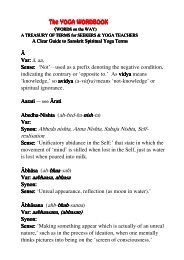Words on the Way - Muz Murray Mantra Yoga Master
Words on the Way - Muz Murray Mantra Yoga Master
Words on the Way - Muz Murray Mantra Yoga Master
You also want an ePaper? Increase the reach of your titles
YUMPU automatically turns print PDFs into web optimized ePapers that Google loves.
my interpolati<strong>on</strong>s in brackets may enclose a c<strong>on</strong>cise meaning of a Sanskrit term, to enable you<br />
to understand <strong>the</strong> gist of <strong>the</strong> text without searching elsewhere in <strong>the</strong> Glossary. As in <strong>the</strong><br />
following example:<br />
Ramana Maharshi stated that: “a jnani [an enlightened being] is a most natural pers<strong>on</strong>. He<br />
may have sankalpas [intenti<strong>on</strong>s or desires of will], but those sankalpas are not binding in<br />
nature. They arise ei<strong>the</strong>r because of prarabdha [karma which has to be worked out in this<br />
lifetime] or due to divine promptings. They do not bind a pers<strong>on</strong> whose mind is dead.”<br />
Purists may object to my choosing to spell Shiva ra<strong>the</strong>r than Siva, or shraddha (faith)<br />
ra<strong>the</strong>r than sraddha, but my preference is for this fashi<strong>on</strong> of transliterati<strong>on</strong> as it makes <strong>the</strong><br />
pr<strong>on</strong>unciati<strong>on</strong> instantly clearer for Westerners. Thus <strong>the</strong> title- word for reference will usually<br />
favour <strong>the</strong> ‘Sh’ transliterati<strong>on</strong>, except perhaps where <strong>the</strong> word is more comm<strong>on</strong>ly known<br />
without <strong>the</strong> ‘h’, such as in Sri, instead of Shri or Shree.<br />
If, while reading an Indian text, you find a word that begins with an Ç, with this flying<br />
accent above it, or ‚ with a dot beneath it, <strong>the</strong>n you may generally look under Sh in <strong>the</strong><br />
Glossary for its explanati<strong>on</strong>.<br />
Pr<strong>on</strong>unciati<strong>on</strong>:<br />
A simple form of pr<strong>on</strong>unciati<strong>on</strong> is appended in paren<strong>the</strong>sis after each word; for example —<br />
Padmåsana (pad-maa-sannah) with <strong>the</strong> syllable to be stressed in bold italic.<br />
As <strong>the</strong> letter Ç is pr<strong>on</strong>ounced more as ‘Sh’ as in sheep, but more softly, with a bit of a lisp,<br />
as if you can’t pr<strong>on</strong>ounce your s’s properly, with your t<strong>on</strong>gue between your teeth, <strong>the</strong><br />
suggested pr<strong>on</strong>unciati<strong>on</strong> will generally be written as ‘sy’ or ‘syuh’ or perhaps ‘shya’,<br />
whichever looks better for any given word.<br />
But <strong>the</strong> Í with <strong>the</strong> dot under it, will be written as ‘sh’ and is pr<strong>on</strong>ounced with <strong>the</strong> t<strong>on</strong>gue tip at <strong>the</strong><br />
palate and flicking across <strong>the</strong> roof of <strong>the</strong> mouth towards <strong>the</strong> teeth.<br />
LAYOUT<br />
Beneath each main word in <strong>the</strong> Glossary are sub-headings, such as:<br />
Var: (short for Variati<strong>on</strong>s); Many Sanskrit words are so variously transliterated that <strong>on</strong>e is never<br />
sure if it is <strong>the</strong> same word <strong>on</strong>e has learned when <strong>on</strong>e comes across it with a different spelling. In this<br />
secti<strong>on</strong>, in order to assist <strong>the</strong> reader in recognising <strong>the</strong> word, where it is evidently incorrectly spelled,<br />
it is entered in paren<strong>the</strong>sis as an example of usage, at <strong>the</strong> end of o<strong>the</strong>r more currently acceptable<br />
variati<strong>on</strong>s, i.e., Swami, Svami, (S’aami, Samy).<br />
All such words listed in this Glossary with obscurely transliterated spellings (unbelievable as <strong>the</strong>y<br />
seem) have been taken from actual examples I have come across over <strong>the</strong> years in books, booklets,<br />
journals or pamphlets in India.<br />
A nor<strong>the</strong>rn Hindu habit is to drop off <strong>the</strong> final ‘a’ from Sanskrit words, such as when writing asan<br />
instead of åsanå, or pranayam, instead of pranayåma. Although this form is currently acceptable in<br />
Hindi usage, in Sanskrit terms it is not c<strong>on</strong>sidered correct and I have <strong>the</strong>refore placed such usage in<br />
paren<strong>the</strong>sis, ie. Var: Aasanaa, (asan).<br />
6



